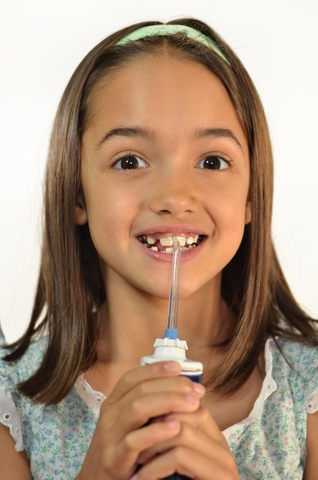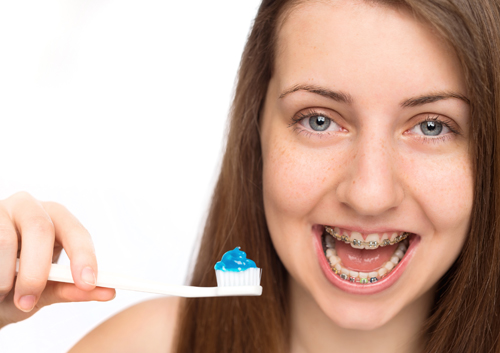July 21st, 2016

Water picks, sometimes called “oral irrigators,” make an excellent addition to your regular home care regimen of brushing and flossing. Especially helpful to those who suffer from periodontal disease and those patients of ours undergoing orthodontic treatment with full-bracketed braces, water picks use powerful tiny bursts of water to dislodge food scraps, bacteria, and other debris nestled in the crevices of your mouth. Children undergoing orthodontic treatment may find using a water pick is beneficial if their toothbrush bristles tend to get caught on their wires or brackets.
When you use a water pick, you’re not only dislodging any particles or debris and bacteria you might have missed when brushing, you are also gently massaging the gums, which helps promote blood flow in the gums and keeps them healthy. While water picks are an excellent addition to your daily fight against gingivitis and other periodontal diseases, they are incapable of fully removing plaque, which is why Dr. Mark Webster and our team at Webster Orthodontics want to remind you to keep brushing and flossing every day.
If you have sensitive teeth or gums and find it uncomfortable to floss daily, water picks are a good alternative to reduce discomfort while effectively cleaning between teeth. Diabetics sometimes prefer water picks to flossing because they don't cause bleeding of the gums, which can be a problem with floss. If you have a permanent bridge, crowns, or other dental restoration, you may find that a water pick helps you keep the area around the restorations clean.
So how do you choose the right water pick?
Water picks are available for home or portable use. The home versions tend to be larger and use standard electrical outlets, while portable models use batteries. Aside from the size difference, they work in the same manner, both using pulsating water streams. A more crucial difference between water picks is the ability to adjust the pressure. Most home models will let you choose from several pressure settings, depending on how sensitive your teeth and gums are. Most portable models have only one pressure setting. If you want to use mouthwash or a dental rinse in your water pick, check the label first; some models suggest using water only.
Please give us a call at our Cedar City or Kanab, UT office if you have any questions about water picks, or ask Dr. Mark Webster during your next visit!
July 14th, 2016

While mouthwash goes a long way in improving your oral care, it is not a substitute for flossing. Mouthwashes and flossing provide different benefits that you should understand.
Mouthwash Benefits
Mouthwash comes in two categories. Some are considered cosmetic. This type of rinse provides temporary relief from bad breath and has a pleasant taste. These do not actually kill any bacteria.
Therapeutic mouthwashes provide the healthier benefits. These may contain different ingredients including fluoride or antimicrobial agents. This type is used to remove plaque buildup and reduce the potential for calculus formation. Therapeutic rinses can also help prevent cavities, bad breath, and gingivitis. In addition, Dr. Mark Webster can prescribe special rinses to assist patients after periodontal surgery or other procedures.
Flossing Benefits
Flossing is what removes the plaque formation before it can harden and become calculus. While a rinse reduces buildup, only flossing will fully remove plaque, especially between teeth. The bristles on a toothbrush do not get between teeth completely. If plaque is not removed, it hardens into tartar or calculus. When this builds below the gum line, gum disease can start.
Types of Floss
Floss is available in a thin string form or a tape. It can be waxed or unwaxed. If you find flossing difficult, you might want to try a different type of floss. You can buy bulk floss in containers or purchase the disposable type with a plastic handle attached. This style can be easier for many individuals to use. Interdental picks are available for bridgework or other situations where regular floss cannot be used.
If you have questions regarding the best mouthwash or floss, or need tips for easier flossing, please ask our Cedar City or Kanab, UT team for advice. We will be glad to give you solutions to help keep your mouth clean and healthy.
July 7th, 2016

We’ve heard all the reasons why folks put off scheduling an orthodontic consultation: not quite ready to begin treatment, vacations, busy schedules, financial concerns, etc.
Here are five reasons why you shouldn’t delay another day to make an appointment for yourself or your child with Dr. Mark Webster.
1. Growth – there is a window of opportunity during growth when an orthopedic appliance can change the direction of jaw growth and dramatically improve your child’s case. Once this time has passed, the correction becomes harder and may involve extraction of teeth or even worse, a surgical procedure to properly align the jaws.
2. Scheduling – Summertime is the perfect time to begin orthodontic treatment, because your child doesn’t have to miss school, especially for those longer appointments needed at the start of treatment.
3. Early Diagnosis – Many times, early interceptive treatment at Webster Orthodontics can dramatically improve the alignment of your child’s teeth and jaws. If baby teeth need to be extracted in order to allow the permanent teeth to erupt, timing is everything. The American Association of Orthodontists recommends that children receive an orthodontic consultation as early as age seven.
4. Financial Concerns – We offer several flexible payment plans which can be extended over your or your child’s treatment time.
5. A Lifetime of Smiles – Why wait when you can enjoy the many benefits of a beautiful and functional smile now. The sooner you get started the sooner you will be showing everyone your world-class smile.
Give us a call at our convenient Cedar City or Kanab, UT office to book your initial consulation with Dr. Mark Webster.
June 30th, 2016

A clean mouth is a happy mouth. And when Dr. Mark Webster and our staff see you have a clean mouth, we are happy too. Of course, all of this should make you happy because you’re the one preventing sneaky little food bits from getting trapped under the wires of your braces.
Still, you need to be thorough with your brushing. When you have braces, you’re playing a game of hide-and-go-seek with everything you eat. Here are five tips to keep your mouth (and us) happy.
- How is brushing with braces like geometry? It’s all about the angles. Brush the tops of your teeth and braces with your brush angled down. Brush the bottom of your teeth with the brush angled up. Pointy brushes, aka interproximal brushes, are good for reaching the tiny spots around braces.
- Brush after every meal. If those sneaky little food bits hide in your mouth for very long, they’ll turn into plaque. And plaque is a sign of a very unhappy mouth.
- Brush one tooth at a time for at least ten seconds, and pay close attention to the spots where your braces touch your teeth.
- Fluoride is your new BFF. Make sure your toothpaste and mouthwash contain this cavity-fighting ingredient.
- Braces are no excuse not to floss. In fact, saying you can’t floss because you have braces is like saying the dog ate your homework. Dr. Mark Webster and our staff, like your geometry teacher, aren’t going to buy it. Be sure to floss after every meal.






